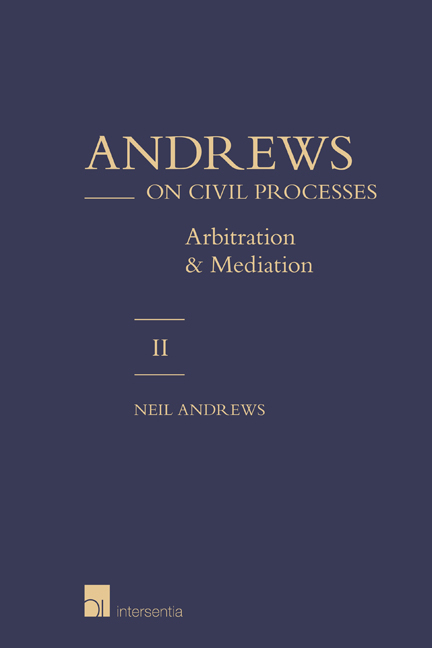Book contents
- Frontmatter
- Dedication
- CONTENTS VOLUME I
- Contents
- Table of Cases
- Table of Statutes
- Table of Statutory Instruments
- PART I MEDIATION
- PART II ARBITRATION
- Chapter 3 Commercial Arbitration: What Is It and Why Choose It?
- Chapter 4 The Major Principles of Arbitration and Litigation: A Comparison
- Chapter 5 Fundamental Features of English Arbitration
- Chapter 6 ‘The Seat’ and the Range of Relevant Laws
- Chapter 7 ‘Arbitrability’: Public Policy Limitations upon the Scope of Arbitration
- Chapter 8 A Confidential Process
- Chapter 9 Arbitration Agreements
- Chapter 10 Courts Giving Effect to Arbitration Agreements
- Chapter 11 Commencement of the Submission and Time Issues
- Chapter 12 The Tribunal's Appointment, Tenure and Immunity
- Chapter 13 Pre-Hearing Proceedings
- Chapter 14 The Hearing
- Chapter 15 Final Remedies, the Award, and Correction of the Award by the Tribunal
- Chapter 16 Fees, Expenses and Recoverable Costs
- Chapter 17 Arbitration Awards: Issues of Finality and Res Judicata
- Chapter 18 Challenges to English Arbitral Awards under English Law
- Chapter 19 English Enforcement of English Awards
- Chapter 20 Enforcement under the New York Convention (1958)
- PART III CONSUMER ADR
- Select Bibliography
- Index to Volumes I and II
Chapter 3 - Commercial Arbitration: What Is It and Why Choose It?
from PART II - ARBITRATION
Published online by Cambridge University Press: 13 December 2017
- Frontmatter
- Dedication
- CONTENTS VOLUME I
- Contents
- Table of Cases
- Table of Statutes
- Table of Statutory Instruments
- PART I MEDIATION
- PART II ARBITRATION
- Chapter 3 Commercial Arbitration: What Is It and Why Choose It?
- Chapter 4 The Major Principles of Arbitration and Litigation: A Comparison
- Chapter 5 Fundamental Features of English Arbitration
- Chapter 6 ‘The Seat’ and the Range of Relevant Laws
- Chapter 7 ‘Arbitrability’: Public Policy Limitations upon the Scope of Arbitration
- Chapter 8 A Confidential Process
- Chapter 9 Arbitration Agreements
- Chapter 10 Courts Giving Effect to Arbitration Agreements
- Chapter 11 Commencement of the Submission and Time Issues
- Chapter 12 The Tribunal's Appointment, Tenure and Immunity
- Chapter 13 Pre-Hearing Proceedings
- Chapter 14 The Hearing
- Chapter 15 Final Remedies, the Award, and Correction of the Award by the Tribunal
- Chapter 16 Fees, Expenses and Recoverable Costs
- Chapter 17 Arbitration Awards: Issues of Finality and Res Judicata
- Chapter 18 Challenges to English Arbitral Awards under English Law
- Chapter 19 English Enforcement of English Awards
- Chapter 20 Enforcement under the New York Convention (1958)
- PART III CONSUMER ADR
- Select Bibliography
- Index to Volumes I and II
Summary
COMPARATIVE DISCUSSION
There are many references in this chapter to reports submitted to the author by distinguished English and foreign experts (the author was fortunate in 2010–11 to receive national reports from various jurisdictions concerning arbitration, in preparation for his General Report on Arbitration at the International Association of Procedural Law's world congress in Heidelberg in 2011). The author also expresses gratitude to these contributors for this material. For reasons of space, it has not been possible to cite verbatim more than occasional fragments from these national reports.
THE NATURE OF ARBITRATION
Arbitration is a means by which two or more parties (including sovereign States) can refer a dispute to a neutral decision-maker for a final decision (an ‘award’).
An arbitral tribunal's power to reach a binding decision on the merits is to be contrasted with mediation (or conciliation) (generally, 1.01 ff). A mediator, although neutral, is not empowered or expected to give a binding decision. A mediator is instead mandated to facilitate a consensual resolution of the parties’ dispute.
The arbitral process displays the triangular configuration of a ‘lis’, that is a juridical dispute between at least two persons. There will be a claim, defence, and factual or legal arguments within the framework of those outline contentions. Supporting material will be marshalled, opposed, and tested. The tendency is for the matter to be considered in an intense and focused way.
The decision-making capacity of the arbitrator is similar to the judgment-delivering capacity of a (public) court or judge. The adjudication of arbitral disputes should be no less procedurally pure and scrupulous than the judicial process of state courts (here the emphasis is on the procedural duties of arbitral tribunals; by contrast, see 3.38 on the general inability within commercial arbitration to examine the tribunal's findings of fact, or even application of substantive legal norms – except in England under section 69, Arbitration Act 1996, which permits the High Court to grant permission in exceptional cases for matters of English law to be re-opened on appeal by the court, 18.67 ff).
- Type
- Chapter
- Information
- Andrews on Civil ProcessesArbitration and Mediation, pp. 85 - 112Publisher: IntersentiaPrint publication year: 2013

